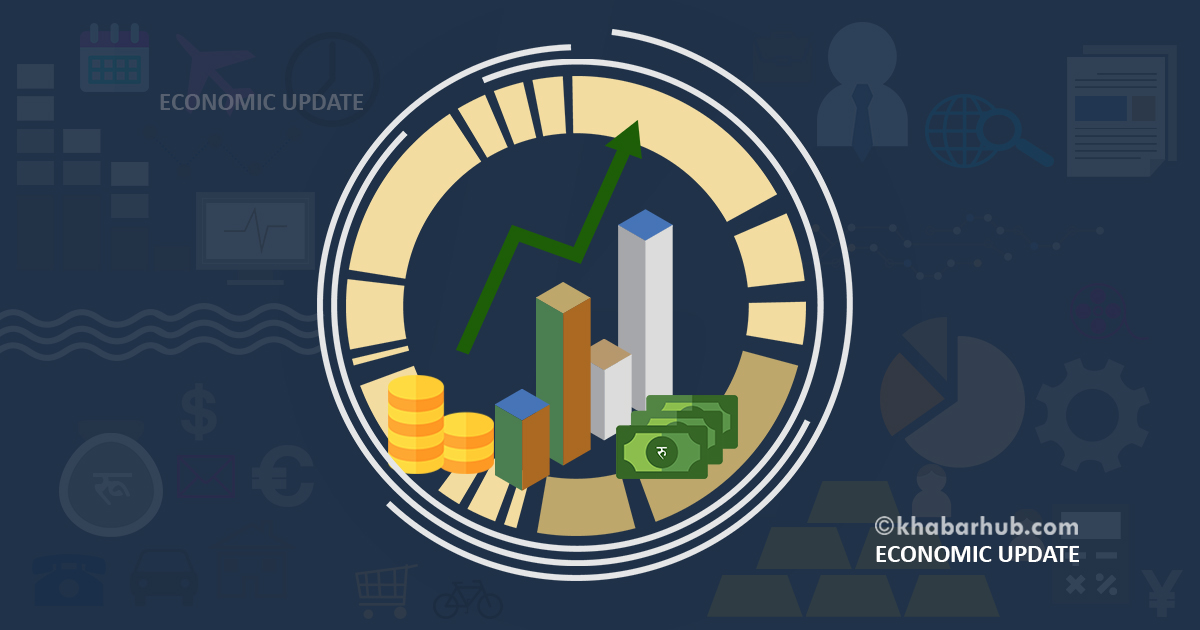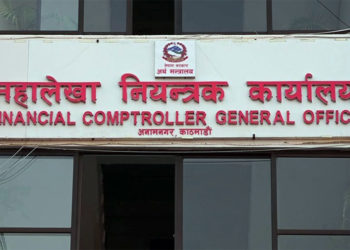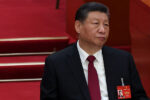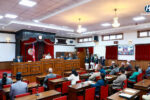KATHMANDU: Economic Digest offers a concise yet comprehensive overview of significant business happenings in Nepal, presented in easily digestible summaries.
On Monday, NEPSE surged by 16.29 points to reach 2,053 points, driven by gains in shares of 176 companies amidst active trading, though 60 companies saw declines. Despite robust activity, trading volume decreased to 7,165,735 shares across 323 companies, generating Rs 2.99 billion in turnover.
Conversely, Nepal Finance investors faced losses. Meanwhile, gold prices rose by Rs 200 per tola in the domestic market, contrasting with stable silver prices. The Nepal Electricity Authority reported record-high demand of 2,316 MW amid a summer heatwave, with expectations of increased production from monsoon rains.
Nepal’s tourism sector struggles with seasonal downturns, exacerbated by economic challenges, while vegetable prices in Kathmandu spiked due to monsoon-related supply disruptions.
NEPSE rises by double digits, trading volume shrinks
On Monday, the Nepal Stock Exchange (NEPSE) experienced a notable surge with its index rising by 16.29 points, marking a climb to 2,053 points. The day saw active trading with shares of 176 companies appreciating in value, contrasting with shares of 60 companies that witnessed declines.
Trading activity remained robust throughout, totaling 7,165,735 shares across 323 companies, resulting in a substantial turnover of Rs 2.99 billion. Among the standout performers were Nepal Finance, leading in trading volume at Rs 191.3 million, followed by NRN at Rs 118.5 million and Janaki Finance at Rs 97.6 million. Notably, Himalayan Energy Development emerged as the top gainer, boasting a return of 9.74 percent, followed closely by Dordi Khola Hydropower and Corporate Development Bank with gains of 8.47 percent and 7.52 percent, respectively.
However, amidst the gains, Nepal Finance investors faced significant losses during the day’s trading session.
Gold prices surge in domestic market; silver holds steady
The domestic gold market experienced a notable Rs 200 increase in prices on Monday, as reported by the Nepal Gold and Silver Dealers’ Association. Fine gold had reached Rs 142,200 per tola, while standard gold was trading at Rs 141,500 per tola, indicating a departure from Sunday’s price of Rs 142,000 per tola.
In contrast, silver prices remained stable at Rs 1,790 per tola. These adjustments reflected dynamic market conditions influenced by factors such as global economic trends, local demand-supply dynamics, and investor sentiment towards precious metals as safe-haven assets or inflation hedges.
It’s important to note that these prices were based on the tola measurement, approximately 11.66 grams, highlighting the specific valuation metrics in the local market.
NEA reports record high electricity demand amid summer heatwave
The Nepal Electricity Authority (NEA) recorded a record-high domestic electricity demand of 2,316 MW on Sunday. Total energy demand reached 51,692 MWh, with NEA and its subsidiaries supplying 12,981 MWh and private sector hydropower companies contributing 29,829 MWh.
Interruptions accounted for 375 MWh, imports were 44 MWh, and exports to India totaled 12,683 MWh. This surge was driven by increased use of electrical appliances like ACs and refrigerators due to soaring temperatures in the summer season.
Although monsoon rains have started in some areas, uniform distribution across the country is pending. The NEA noted excess electricity supply during nighttime and expects production to further increase with rising water levels from monsoon rains, potentially reducing import dependency and boosting exports.
Nepal’s tourism sector struggles with seasonal downturns amid economic challenges
During periods of economic recession, tourism-related businesses in Nepal are significantly affected by seasonal downturns. Traditionally, foreign tourist arrivals are sparse during the summer (June-August) and winter (December-February) seasons, with peak seasons occurring in spring (March-May) and autumn (September-November).
This ‘off season’ stagnation compels tourism entrepreneurs to remain inactive, exacerbated by inadequate government attention and promotional efforts for summer tourist spots.
Despite Nepal’s tourism potential, Sajan Shakya from the Hotel Association of Nepal highlights the need for new strategies, including promoting short-distance trails and seasonal programs, to attract tourists year-round.
Monsoon sparks soaring vegetable prices in Kathmandu valley
Vegetable prices in the Kathmandu Valley have surged dramatically as the monsoon gains momentum, resulting in higher kitchen expenses for residents. Essential items like ginger, green chillies, tomatoes, and potatoes have become increasingly unaffordable for ordinary people.
Traders attribute the price hikes to reduced production during the pre-monsoon period and disruptions in the supply chain caused by recent floods and landslides. According to the Nepal Rastra Bank’s macroeconomic report, vegetable prices, as measured by the consumer price index, rose by 23.11 percent in mid-May.
The Kalimati Fruits and Vegetable Market Development Board reports a decrease in locally grown vegetable supply since winter, with the shortfall being met by imports from India. Flooding and landslides during the monsoon have further exacerbated the supply situation, driving prices higher with no immediate signs of decline.
HoR approves Investment Facilitation Bill
The House of Representatives (HoR) on Monday endorsed passed the Bill aimed at amending several Nepalese laws concerning investment facilitation for the year 2081 BS. Minister for Industry, Commerce, and Supplies, Damodar Bhandari, introduced the bill, which received majority approval. Originally prompted by the Third Investment Summit, the government initially issued an ordinance to assure investors of forthcoming policy reforms.
The legislation includes amendments related to startup registration, foreign investment protocols, technology transfer, extended operational terms for industries, contract-based production of goods, and other pertinent matters.
Tuesday’s foreign exchange rates
The Nepal Rastra Bank has revised foreign currency exchange rates, marking an overall increase in major currencies’ values against the Nepalese Rupee. The US Dollar, Euro, British Pound, Australian Dollar, Kuwaiti Dinar, and Bahraini Dinar all saw higher buying and selling rates compared to yesterday.
Specifically, the US Dollar’s buying rate is now NPR 133.21 and the selling rate NPR 133.81, up from NPR 133.12 and NPR 133.72 respectively over the past three days. Similarly, the Euro, British Pound, Australian Dollar, Kuwaiti Dinar, and Bahraini Dinar have all registered higher buying and selling rates today compared to yesterday’s rates.
This adjustment reflects recent fluctuations in international currency markets impacting Nepal’s exchange rates.
(Compiled and prepared by Srija Khanal)
Economic Digest is a daily morning economic digest, basically relatable summations of the most important business news, and happenings from Nepal into easy-to-understand summaries.









Comment